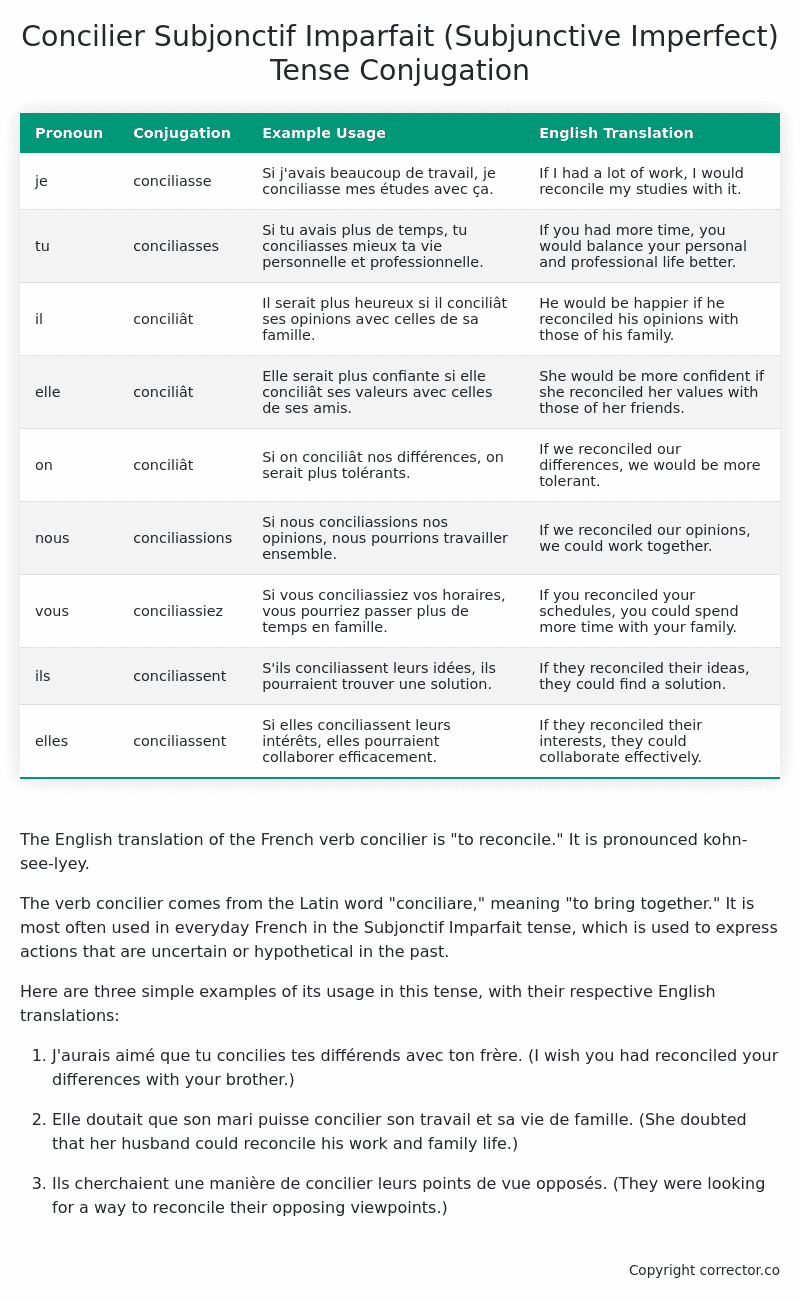Subjonctif Imparfait (Subjunctive Imperfect) Tense Conjugation of the French Verb concilier
Introduction to the verb concilier
The English translation of the French verb concilier is “to reconcile.” It is pronounced kohn-see-lyey.
The verb concilier comes from the Latin word “conciliare,” meaning “to bring together.” It is most often used in everyday French in the Subjonctif Imparfait tense, which is used to express actions that are uncertain or hypothetical in the past.
Here are three simple examples of its usage in this tense, with their respective English translations:
-
J’aurais aimé que tu concilies tes différends avec ton frère. (I wish you had reconciled your differences with your brother.)
-
Elle doutait que son mari puisse concilier son travail et sa vie de famille. (She doubted that her husband could reconcile his work and family life.)
-
Ils cherchaient une manière de concilier leurs points de vue opposés. (They were looking for a way to reconcile their opposing viewpoints.)
Table of the Subjonctif Imparfait (Subjunctive Imperfect) Tense Conjugation of concilier
| Pronoun | Conjugation | Example Usage | English Translation |
|---|---|---|---|
| je | conciliasse | Si j’avais beaucoup de travail, je conciliasse mes études avec ça. | If I had a lot of work, I would reconcile my studies with it. |
| tu | conciliasses | Si tu avais plus de temps, tu conciliasses mieux ta vie personnelle et professionnelle. | If you had more time, you would balance your personal and professional life better. |
| il | conciliât | Il serait plus heureux si il conciliât ses opinions avec celles de sa famille. | He would be happier if he reconciled his opinions with those of his family. |
| elle | conciliât | Elle serait plus confiante si elle conciliât ses valeurs avec celles de ses amis. | She would be more confident if she reconciled her values with those of her friends. |
| on | conciliât | Si on conciliât nos différences, on serait plus tolérants. | If we reconciled our differences, we would be more tolerant. |
| nous | conciliassions | Si nous conciliassions nos opinions, nous pourrions travailler ensemble. | If we reconciled our opinions, we could work together. |
| vous | conciliassiez | Si vous conciliassiez vos horaires, vous pourriez passer plus de temps en famille. | If you reconciled your schedules, you could spend more time with your family. |
| ils | conciliassent | S’ils conciliassent leurs idées, ils pourraient trouver une solution. | If they reconciled their ideas, they could find a solution. |
| elles | conciliassent | Si elles conciliassent leurs intérêts, elles pourraient collaborer efficacement. | If they reconciled their interests, they could collaborate effectively. |
Other Conjugations for Concilier.
Le Present (Present Tense) Conjugation of the French Verb concilier
Imparfait (Imperfect) Tense Conjugation of the French Verb concilier
Passé Simple (Simple Past) Tense Conjugation of the French Verb concilier
Passé Composé (Present Perfect) Tense Conjugation of the French Verb concilier
Futur Simple (Simple Future) Tense Conjugation of the French Verb concilier
Futur Proche (Near Future) Tense Conjugation of the French Verb concilier
Plus-que-parfait (Pluperfect) Tense Conjugation of the French Verb concilier
Passé Antérieur (Past Anterior) Tense Conjugation of the French Verb concilier
Futur Antérieur (Future Anterior) Tense Conjugation of the French Verb concilier
Subjonctif Présent (Subjunctive Present) Tense Conjugation of the French Verb concilier
Subjonctif Passé (Subjunctive Past) Tense Conjugation of the French Verb concilier
Subjonctif Imparfait (Subjunctive Imperfect) Tense Conjugation of the French Verb concilier (this article)
Subjonctif Plus-que-parfait (Subjunctive Pluperfect) Tense Conjugation of the French Verb concilier
Conditionnel Présent (Conditional Present) Tense Conjugation of the French Verb concilier
Conditionnel Passé (Conditional Past) Tense Conjugation of the French Verb concilier
L’impératif Présent (Imperative Present) Tense Conjugation of the French Verb concilier
L’infinitif Présent (Infinitive Present) Tense Conjugation of the French Verb concilier
Struggling with French verbs or the language in general? Why not use our free French Grammar Checker – no registration required!
Get a FREE Download Study Sheet of this Conjugation 🔥
Simply right click the image below, click “save image” and get your free reference for the concilier Subjonctif Imparfait tense conjugation!

Concilier – About the French Subjonctif Imparfait (Subjunctive Imperfect) Tense
Formation
Common Everyday Usage Patterns
Interactions with Other Tenses
Subjonctif Présent
Indicatif Passé Composé
Conditional
Conditional Perfect
Summary
I hope you enjoyed this article on the verb concilier. Still in a learning mood? Check out another TOTALLY random French verb conjugation!


